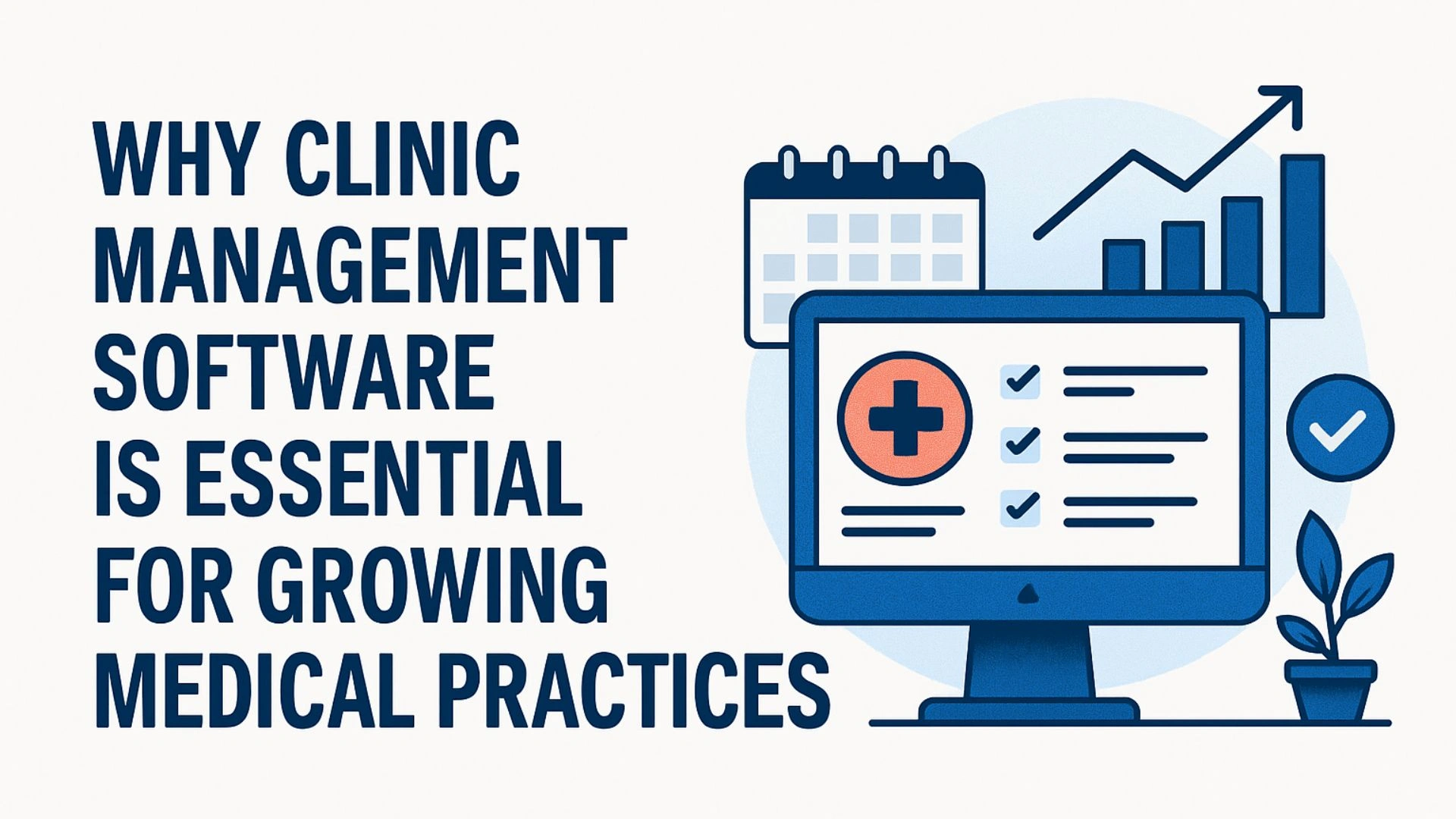Are you struggling to streamline your clinic’s operations, manage patient data effectively, and ensure smooth communication across your practice? If so, it might be time to explore the incredible potential of clinic management software.
In today’s fast-paced healthcare environment, the success of a medical practice depends not just on the expertise of its healthcare providers but also on the efficiency of its operations. Clinic management software is more than just a tool for managing appointments; it is a comprehensive solution designed to enhance the overall productivity and service delivery of a medical practice.
But why is clinic management software so essential for growing medical practices? Let’s delve into the details and explore how adopting the right software solution can propel your practice to new heights of efficiency and success.
How Does Clinic Management Software Help Streamline Daily Operations?
Managing a clinic involves juggling multiple tasks: scheduling appointments, managing patient records, billing, and coordinating with staff members. When these tasks are done manually or through disparate systems, it can lead to errors, inefficiencies, and a lot of unnecessary work.
Clinic management software simplifies these tasks by centralizing all your operations into one easy-to-use platform. With features like automated appointment scheduling, patient data management, and integrated billing systems, it enables you to handle everything from one dashboard.
For example, automated appointment reminders reduce the number of missed appointments, while integrated billing features ensure that payments and insurance claims are processed smoothly, improving cash flow. Additionally, centralized patient records mean your team can access all relevant information without wasting time searching through physical files or multiple systems.
How Can Clinic Management Software Improve Patient Care?
When your clinic’s operational tasks are running smoothly, your healthcare providers can focus more on what matters most: patient care. Clinic management software helps ensure that healthcare professionals have instant access to patient history, treatment plans, and previous appointments.
This level of organization allows providers to make informed decisions quickly, improving the accuracy of diagnoses and treatment plans. Furthermore, some clinic management software comes with integrated telemedicine features, making it easier for healthcare providers to offer virtual consultations, which is becoming increasingly important in today’s healthcare landscape.
Having up-to-date patient records also means fewer mistakes when administering medication, reducing the likelihood of adverse drug reactions. In short, the more efficient your practice is behind the scenes, the better the quality of care your patients receive.
How Does Clinic Management Software Help with Financial Management?
One of the most challenging aspects of running a medical practice is ensuring that the business side of things remains profitable and sustainable. Clinic management software is equipped with financial management tools that simplify billing, track insurance claims, and offer insights into your practice’s financial health.
With automated billing features, software can generate invoices, track payments, and handle insurance claims more efficiently. Some systems even offer features for managing patient payments and payment plans, reducing the burden on your administrative team and improving cash flow.
Moreover, detailed financial reports generated by clinic management software give you a clear picture of your practice’s profitability, helping you make informed decisions about spending, resource allocation, and future growth strategies.
What Role Does Clinic Management Software Play in Enhancing Patient Satisfaction?
In an increasingly competitive healthcare environment, patient satisfaction is paramount. Clinic management software offers several features that can greatly enhance the patient experience.
For example, online appointment scheduling allows patients to book, reschedule, or cancel their appointments at their convenience. This self-service option is a major time-saver for both patients and your staff.
Additionally, many clinic management systems offer patient portals where individuals can access their medical records, view test results, and communicate with healthcare providers. This level of transparency not only enhances patient satisfaction but also builds trust between the practice and its patients.
Automated reminders and notifications also ensure that patients are never left wondering about their next appointment, helping to keep your clinic’s schedule running smoothly and ensuring patients stay on top of their treatment plans.

How Can Clinic Management Software Improve Staff Efficiency?
A key benefit of clinic management software is its ability to improve staff efficiency. Healthcare providers, office managers, and support staff all benefit from having a centralized, streamlined platform that reduces the need for repetitive tasks and manual data entry.
For example, administrative staff no longer need to spend hours scheduling appointments manually or tracking patient records across paper files. With automated systems in place, they can focus on more productive tasks, such as assisting patients or managing day-to-day operations.
Providers also benefit from faster access to patient records and treatment history, which speeds up decision-making and reduces the time spent on paperwork.
This increased efficiency allows your team to handle more patients without sacrificing the quality of care or service, ultimately helping your practice grow.
How Does Clinic Management Software Ensure Compliance and Data Security?
In the medical industry, compliance with regulations like HIPAA (Health Insurance Portability and Accountability Act) is crucial to maintaining patient confidentiality and avoiding legal issues. Clinic management software is designed with these regulations in mind, ensuring that your clinic’s data handling processes are secure and compliant.
From encrypted data storage to secure access control features, the right clinic management software offers multiple layers of protection for patient data. Furthermore, audit trails and reporting features help you stay on top of compliance and ensure that your practice is meeting all necessary legal and regulatory requirements.
By implementing clinic management software that prioritizes security and compliance, you can rest assured that your practice is protected against potential data breaches and legal issues.
What are the Key Features to Look for in Clinic Management Software?
Not all clinic management software is created equal, so it’s important to know what features to look for when selecting a solution for your practice. Here are some essential features to consider:
- Appointment Scheduling: Look for software that offers easy scheduling, automated reminders, and the ability for patients to book appointments online.
- Patient Records Management: Choose software that centralizes patient records, making it easy to access history, test results, and treatment plans.
- Billing and Financial Management: Make sure the software includes integrated billing features that handle insurance claims, patient payments, and financial reporting.
- Telemedicine Capabilities: With virtual consultations becoming more popular, it’s important to choose software that supports telehealth features.
- Compliance and Security: Ensure the software offers HIPAA-compliant features and robust security protocols to protect patient data.
- Analytics and Reporting: Look for software that generates insightful reports on various aspects of your clinic’s performance, including patient flow, revenue, and patient satisfaction.
Conclusion
The role of clinic management software in the growth and efficiency of a medical practice cannot be overstated. From streamlining daily operations to improving patient care, managing finances, and enhancing overall satisfaction, it’s clear that this technology is a game-changer for modern healthcare practices.
If you want to stay ahead in today’s competitive healthcare market, investing in the right clinic management software can make all the difference. It’s not just about managing your clinic—it’s about managing it well.
FAQs on Clinic Management Software
Q1: How does clinic management software improve the overall patient experience?
Clinic management software enhances patient experience by offering features like online appointment booking, automated reminders, patient portals, and improved communication with healthcare providers. These features save time and ensure that patients have a more convenient and transparent experience.
Q2: Is clinic management software customizable?
Yes, many clinic management software solutions offer customization options, allowing practices to tailor features to their specific needs. Whether it’s customizing patient intake forms or adjusting scheduling workflows, flexibility is a key benefit of most software solutions.
Q3: How much does clinic management software cost?
The cost of clinic management software can vary depending on the size of your practice, the features you require, and whether you choose a cloud-based or on-premises solution. It’s important to weigh the benefits of the software against the costs to determine the best fit for your practice.
Q4: Can clinic management software integrate with other systems?
Many clinic management software solutions offer integration with other systems, such as electronic health records (EHR), laboratory systems, and accounting software. This ensures that all aspects of your clinic’s operations are seamlessly connected.
Q5: Is training required to use clinic management software?
While many clinic management software solutions are user-friendly, training may be required to ensure your staff can fully utilize the system. Most software providers offer training resources and support to help your team get up to speed quickly.



